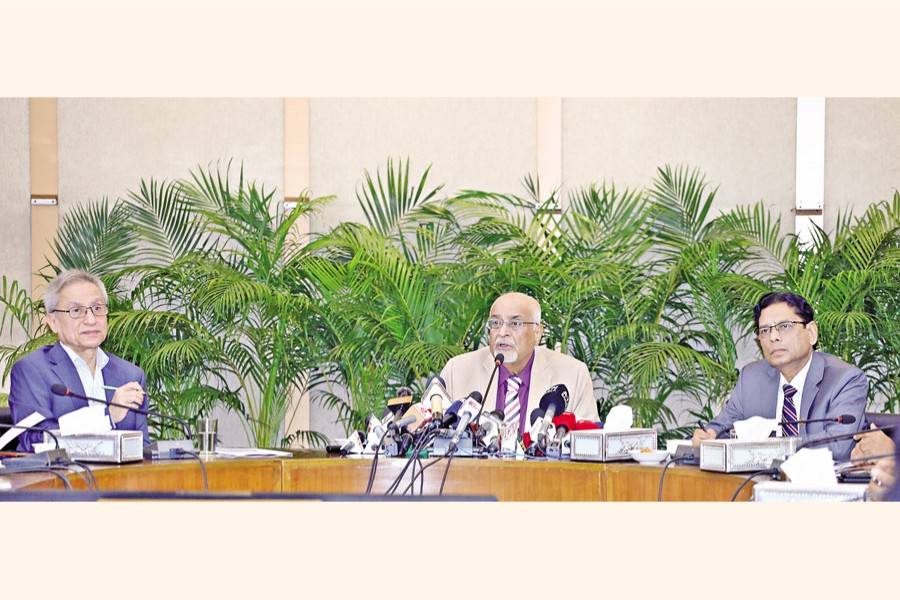
Published :
Updated :

Bangladesh has become a "kleptocratic" state from a "crony capitalist" one over the years under the influence of bureaucrats, politicians and businesses, White Paper Committee chief Dr Debapriya Bhattacharya said on Monday.
Besides, the country has fallen into a "middle-income trap" as its growth narrative was biased and not true, said Dr Zahid Hussain who sits on the committee.
"Politicians, businessmen, bureaucrats and some other groups played key roles in turning the country into a kleptocratic state over the years," Dr Debapriya told a press briefing at the Planning Commission.
The kleptocratic state started forming since the 2018 general election, manipulated by the ousted government. The place of accountability of local governments has also been demolished, according to him.

The committee has called for the government to prepare a shorter and mid-term development plan as the five-year development plan has been suspended.
The government should sit with global leaders for an "Inclusive Development Forum" with the presence of development partners and foreign investors with its specific mission and vision.
The Debapriya-led committee was briefing on the findings of their 399-page draft report. All the 12 members of the panel were present there.
The interim government, led by Prof Dr Muhammad Yunus, formed the 12-member committee to prepare the white paper on the state of the country's economy three months ago.
The white paper is the second of its kind in Bangladesh as the Bangladesh Nationalist Party (BNP) during its 2001-2005 tenure framed a two-part white paper on corruption committed by the 1996-2001 Awami League government.
To turn the country into a "kleptocratic state", Dr Debapriya said, some civil-society actors, media people and even development partners (DPs) are also responsible with politicians, businessmen and civil servants.
"We've talked with some DPs. They informed us that they were forced to echo the same voice with the past government or they were threatened to close their offices in Bangladesh," he mentioned.
Meanwhile, the committee has strongly support Bangladesh's aspiration to become a developing nation in 2026 through graduating from its least-developed country (LDC) status.
Despite massive corruption, money laundering, state wealth looting and data manipulations, according to Dr Debapriya, the country has been developing and it is on track for graduation.
When asked, Dr Debapriya said there was still development in the country, which would not affect its becoming a developing nation by 2026.
The government needs some actionable steps to ensure macro-economy stability, a proper fiscal management, and reforms in its structure and administrative polices to help the country face the challenges.
Dr Debapriya, also a distinguished fellow of the Centre for Policy Dialogue (CPD), said Bangladesh was such a country compared to other LDCs, which should not remain poor any more.
Meanwhile, he suggested ensuring macro-economic stability, cooling down commodity prices, improving law and order, and placing a vision of the interim government before the general public shortly.
The noted economist has advised the government to form a "Data Commission" for reviewing the data and statistics, manipulated by the past government for the 'discretion of development narratives'.
According to the committee, the most notable feature of Bangladesh's recent official growth estimates is its acceleration in the decade of 2010.
"This raised Bangladesh to the status of the "fastest-growing" country in the world's development business community. Though not entirely undeserved, the hype around it... hid the slippage into a self-made trap far below the upper middle-income threshold."
Employment has remained concentrated in low productivity agriculture and informal activities, resource misallocations are ubiquitous, and the competitiveness of the economy has slipped, according to the paper.
Replying to another question, Dr Debapriya said the banking sector had been the most-affected sector in terms of corruption during the last 15 years, followed by physical infrastructure, energy and ICT.
Meanwhile, Prof Mustafizur Rahman, a member of the committee and a CPD distinguished fellow, also spoke of Bangladesh's fall into a middle-income trap.
"Now, we are assuming that the country may fall into the debt trap shortly if the government is not become cautious," he cited.
Prof Rahman said loan agreements with development partners should be reviewed properly and Bangladesh in some cases should request them to defer repayments because of this current economic situation.
Prof M Tamim of BUET said the government had looted at least 10 per cent from its $30-33 billion investments during its tenure from the energy sector.
The committee handed its draft report to the chief adviser on Sunday.
kabirhumyan10@gmail.com


 For all latest news, follow The Financial Express Google News channel.
For all latest news, follow The Financial Express Google News channel.